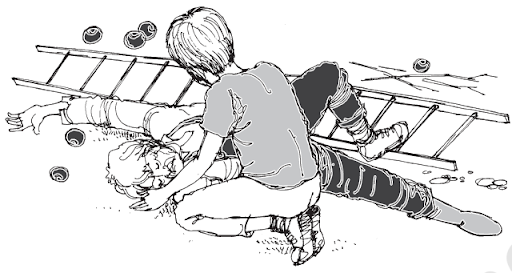Character Sketch: On The Face Of It | English Class 12 PDF Download

Character Sketch of Derry
- Thoughtful and Kind – Despite his difficult circumstances, Derry is able to see the beauty in the world.
- Lonely and Withdrawn – His physical disability and scarred face make him isolate himself from others.
- Insecure – Suffers from an inferiority complex and believes others see him as monstrous.
- Wary and Defiant – Avoids people to prevent being hurt, and interacts with anger and defiance when necessary.
- Longing for Connection – Despite his fear, he yearns for human connection, as seen in his interactions with Mr. Lamb.
Derry, a 14-year-old boy, struggles with a profound sense of inferiority due to a terrible accident in his childhood that left him with a scarred face and blind in one eye. This physical disability makes him lonely and withdrawn, avoiding the company of others because he believes people are scared by his appearance. This self-imposed isolation leads Derry to create a tough and reserved exterior, wary of interactions to avoid further hurt.
Derry’s encounter with Mr. Lamb marks a significant turning point in his life. Mr. Lamb’s open nature and peculiar questions intrigue Derry, suggesting that he longs for human connection despite his fear of rejection. This longing is confirmed when he defies his mother’s dehumanizing pity and returns to Mr. Lamb’s garden, where he simply wants to sit and talk with the old man.
Through Mr. Lamb’s influence, Derry gains confidence and begins to develop a positive attitude towards life. He learns to see beyond his physical appearance and appreciate the beauty in the world. Despite his difficult circumstances, Derry’s thoughtful and kind nature emerges, showing his potential for growth and connection. His transformation highlights the impact of empathy and kindness in overcoming personal insecurities and finding a sense of belonging.

Character Sketch of Mr. Lamb
- Wise and Contemplative – Enjoys observing, listening, and learning from others and nature.
- Open-Minded – Keeps his garden gate open and believes “all are welcome.”
- Positive Attitude – Maintains a positive outlook despite his disability.
- Kind and Empathetic – Demonstrates kindness and empathy, helping Derry change his attitude towards life.
- Lonely – Though he claims to have many friends, it’s suggested he may be lonely.
Mr. Lamb, a central character in the play, is an old man and a World War II veteran who lost a leg in the war and now uses a tin leg. He lives alone in a big house with a garden, where he keeps himself busy with activities like growing crab apples, keeping bees, reading, and making toffee and jelly. Mr. Lamb is wise and contemplative, enjoying the act of observing, listening, and learning from other people and the natural world around him.
He embodies a philosophy of openness and non-judgmental connection, which is evident in his practice of keeping his garden gate open and welcoming all visitors. His openness is further symbolized by the absence of curtains on his windows, as he likes to see the light and dark and hear the weather outside. Despite his positive attitude and claim of having "hundreds" of friends, Derry suspects Mr. Lamb is actually lonely and unhappy, and no one visits him.
Mr. Lamb’s kindness and empathy significantly impact Derry, a boy with a scarred face who is filled with negativity. Through their conversations, Mr. Lamb teaches Derry to be happy with himself and not to burn with hatred for others. Mr. Lamb’s ability to see the dignity in all people and his wisdom about living a fulfilled life make him a role model for both Derry and the readers. Although it’s suggested that Mr. Lamb dies after falling from a ladder while picking apples, his influence on Derry’s life and the lessons he imparts remain powerful.
Character Sketch of Derry’s Mom
- Overprotective – Keeps Derry home because of his facial injury.
- Misunderstanding – Doesn’t grasp Derry’s longing for companionship.
- Pitying – Treats Derry with pity, undermining his dignity and agency.
- Restrictive – Forbids Derry from meeting Mr. Lamb.
Derry’s mother is a minor character in the play, but her actions and attitude have a significant impact on Derry’s life. She is overprotective, keeping him home due to his facial injury, and doesn’t understand his need for companionship. Her pitying attitude robs Derry of his dignity and agency, treating him as a helpless victim rather than a capable individual. When she forbids him from returning to Mr. Lamb’s house, it highlights her lack of understanding of his needs. However, this also prompts Derry to assert himself positively by defying her restrictions and seeking out the companionship and understanding he craves with Mr. Lamb.
|
29 videos|317 docs|82 tests
|
FAQs on Character Sketch: On The Face Of It - English Class 12
| 1. Who are the main characters in the play "On The Face Of It"? |  |
| 2. What is the relationship between Derry and Mr. Lamb in the play? |  |
| 3. How does Derry's Mom contribute to the overall storyline of the play "On The Face Of It"? |  |
| 4. What is the central theme of the play "On The Face Of It"? |  |
| 5. How does the character of Mr. Lamb impact Derry's perception of himself and the world around him? |  |






















